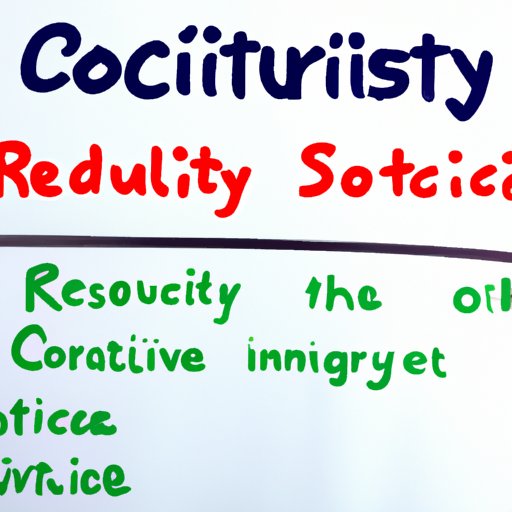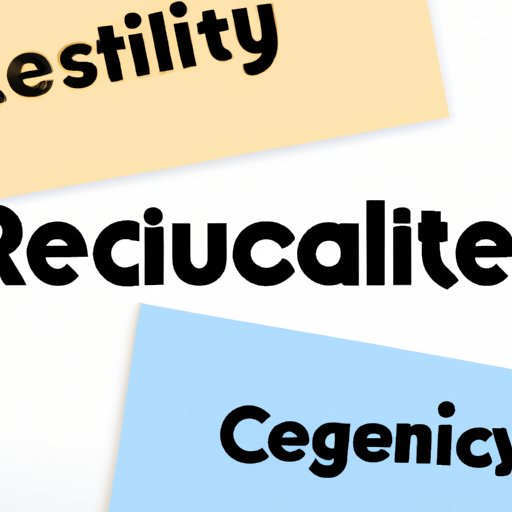Introduction
Cultural relativism is a concept that emphasizes the importance of understanding and respecting the beliefs and values of different cultures. It is based on the idea that each culture has its own set of norms and values, which should be viewed in terms of their own context rather than judged by outside standards. This concept has become increasingly important in today’s globalized world, where people from a variety of backgrounds are interacting more than ever before.

Analyzing the Positive Effects of Cultural Relativism on Society
Cultural relativism can have a number of positive effects on society. By encouraging understanding and respect for other cultures, it can help foster tolerance and reduce prejudice and discrimination. It can also lead to greater harmony and peace between different groups, as people learn to appreciate the similarities and differences between cultures.
How Cultural Relativism Encourages Understanding and Respect
Cultural relativism helps to promote understanding and respect for different cultures. By recognizing that all cultures have their own set of beliefs and values, it encourages people to be open-minded and accepting of others. This can help to break down cultural barriers and reduce prejudice, as people come to see that there is more that unites us than divides us.
Promoting Tolerance for Diversity
Cultural relativism can also help to promote tolerance for diversity. By recognizing that not all cultures share the same beliefs and values, it encourages people to accept and respect the differences between them. This can lead to greater understanding and appreciation for different cultures, which can in turn help to create a more harmonious society.
How Cultural Relativism Can Lead to Harmony and Peace
Cultural relativism can also lead to greater harmony and peace between different cultures. By recognizing the unique qualities of each culture, it can help to foster cooperation and collaboration between them. This can lead to a more unified world, where people from different backgrounds can work together to achieve common goals.

Examining the Benefits of Applying Cultural Relativism to International Relations
Cultural relativism can also be beneficial when applied to international relations. By understanding and respecting the beliefs and values of other countries, it can help to improve diplomatic relations and facilitate cooperation between nations. This can lead to a more peaceful and secure world, as countries come to recognize the value of working together.
How Cultural Relativism Can Improve Diplomatic Relations
Cultural relativism can help to improve diplomatic relations between countries. By recognizing the unique perspectives of each nation, it can encourage dialogue and negotiation instead of conflict. This can lead to better understanding between countries, which can in turn lead to stronger relationships and more constructive solutions to problems.
How Cultural Relativism Can Facilitate Cooperation Between Nations
Cultural relativism can also help to facilitate cooperation between nations. By recognizing the shared interests and goals of different countries, it can help to create a sense of unity and solidarity. This can lead to greater collaboration and problem-solving, as countries come to realize the value of working together.
Exploring How Cultural Relativism Can Enhance Intercultural Communication
Cultural relativism can also be beneficial when it comes to intercultural communication. By recognizing the unique perspectives of different cultures, it can help to foster mutual respect and understanding. This can lead to improved language skills and increased knowledge of other cultures, which can in turn benefit both individuals and societies.
How Cultural Relativism Can Help Develop Mutual Respect
Cultural relativism can help to develop mutual respect between people from different cultures. By recognizing that each culture has its own set of beliefs and values, it encourages people to be open-minded and accepting of others. This can lead to more meaningful dialogue and improved intercultural communication, as people come to understand one another more deeply.
How Cultural Relativism Can Improve Language Skills
Cultural relativism can also help to improve language skills. By understanding the different ways that people communicate in different cultures, it can help to bridge the gap between them. This can lead to better communication and more meaningful conversations, as people come to appreciate the nuances of different languages.
How Cultural Relativism Can Expand Knowledge of Other Cultures
Cultural relativism can also help to expand knowledge of other cultures. By recognizing the unique qualities of different cultures, it can help to increase awareness and understanding. This can lead to a greater appreciation for the richness and diversity of other cultures, which can in turn benefit both individuals and societies.

Investigating the Impact of Cultural Relativism on Human Rights
Cultural relativism can also have a positive impact on human rights. By recognizing the importance of understanding and respecting the beliefs and values of different cultures, it can help to reduce prejudice and discrimination. It can also increase awareness of human rights issues, which can lead to greater protection of vulnerable populations.
How Cultural Relativism Can Reduce Prejudice and Discrimination
Cultural relativism can help to reduce prejudice and discrimination against minority groups. By recognizing the unique perspectives of different cultures, it can help to promote understanding and acceptance of diversity. This can lead to greater respect for the rights of all individuals, regardless of their background.
How Cultural Relativism Can Increase Awareness of Human Rights Issues
Cultural relativism can also help to increase awareness of human rights issues. By recognizing the importance of understanding different cultures, it can help to raise awareness of the struggles faced by marginalized populations. This can lead to greater protection of vulnerable individuals, as people come to recognize their inherent worth and dignity.
Discussing the Implications of Cultural Relativism for Social Justice
Cultural relativism can also have implications for social justice. By recognizing the importance of understanding and respecting the beliefs and values of different cultures, it can help to address inequality and oppression. It can also promote equality and fairness, as people come to recognize the value of diversity.
How Cultural Relativism Can Address Inequality and Oppression
Cultural relativism can help to address inequality and oppression. By recognizing the unique perspectives of different cultures, it can help to reduce prejudice and discrimination. This can lead to greater protection of vulnerable populations, as people come to recognize their inherent worth and dignity.
How Cultural Relativism Can Promote Equality and Fairness
Cultural relativism can also help to promote equality and fairness. By understanding and respecting the beliefs and values of different cultures, it can help to create a more equitable society. This can lead to greater access to resources and opportunities for all individuals, regardless of their background.
Conclusion
Cultural relativism is a concept that emphasizes the importance of understanding and respecting the beliefs and values of different cultures. It can have a number of positive effects on society, including promoting understanding and respect, fostering tolerance for diversity, improving diplomatic relations, enhancing intercultural communication, reducing prejudice and discrimination, and addressing inequality and oppression. As the world becomes increasingly interconnected, cultural relativism will continue to play an important role in promoting understanding and respect for diversity.
In conclusion, cultural relativism is an important concept that can help to foster understanding and respect for different cultures. By recognizing the unique qualities of each culture, it can help to promote tolerance and reduce prejudice and discrimination. It can also lead to greater harmony and peace between different groups, as well as improved diplomatic relations and enhanced intercultural communication. Finally, it can help to protect human rights and promote social justice, as people come to recognize the value of diversity.
Call to Action
If you want to make a difference in the world, start by practicing cultural relativism. Educate yourself about different cultures and strive to understand and respect the beliefs and values of those around you. Be open-minded and accepting of others, and work to reduce prejudice and discrimination. Together, we can create a more harmonious and just world.
(Note: Is this article not meeting your expectations? Do you have knowledge or insights to share? Unlock new opportunities and expand your reach by joining our authors team. Click Registration to join us and share your expertise with our readers.)
